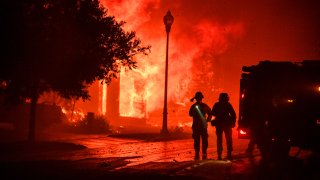
The world is getting warmer, but the global response has "remained muted" despite efforts like the Paris Climate Agreement — and millions of lives are at risk as a result.
This according to a report published Wednesday by The Lancet, a leading peer-reviewed medical journal.
"This past year, we have seen the harms of our converging crises — COVID-19, climate disasters, and systemic racism; it's been a preview of what lies ahead if we fail to urgently make the necessary investments to protect health," Renee Salas, lead author of the U.S. Lancet Countdown Policy Brief, said in a statement published alongside the report.
Salas likened the kind of plan needed to what she does during her day job as an emergency room doctor.
"Just like in my emergency department, I can't take one health problem and place it in isolation because one insult on the body creates new problems and worsens old ones," Salas says. "We must take an integrated approach when tackling these challenges. Climate action is the prescription we need for better health and equity as we emerge from this pandemic."
The report, which is a collaboration of more than 100 experts from 35 global institutions including the World Health Organization, World Bank, University College London and Tsinghua University in Beijing, also details some ramifications of global warming.
In 2018 in the U.S. alone, pollution caused more than 68,000 people to die prematurely. About 25,000 of those deaths were due to particulates released into the air by the agriculture and transportation industries, according to the report.
Money Report
There were 19,000 heat-related deaths in people 65 and over in the U.S. in 2018, the report said. Further, the hottest days resulted in 2 billion hours of lost labor in the U.S. in the service, manufacturing, agricultural and construction sectors in 2019.
Dangerous bacteria are also increasing in coastal waters. For example, Vibrio bacteria, which lives off Northeast shores and can cause gastrointestinial distress, skin infections and sometimes death, has increased as climate change has warmed waters and created more ideal salinity for its growth, the report said.
And as seen in 2020, wildfire risk has exploded in recent years, said the report.
According to The Lancet report, where people live and how much money they have directly effects their capacity to resist threats to their health from climate change.
"In the US, we see clear evidence of how certain communities are more burdened by pre-existing inequities," Dr. Jeremy Hess, author on both the global report and the U.S. breakout, said in a written statement. "We have a great opportunity in the recovery from the pandemic to address our vulnerabilities and increase our resilience to the stresses that climate is sure to continue to bring."
See also:
These 10 innovative face masks were designed by young people competing for $1 million XPRIZE
Top economists Stiglitz and Piketty: The US needs a wealth tax on millionaires and billionaires
Don't miss: Highest-ever Amex Gold Card welcome bonus is worth up to $600 in gift cards






